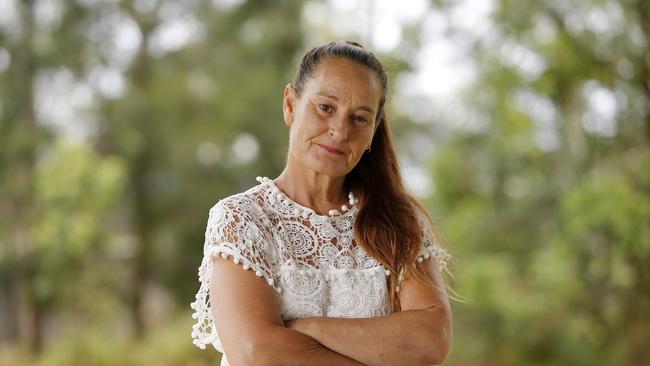Struggling families targeted by ruthless payday lenders
WHEN Trina Begg borrowed $600 to fix her car, she never dreamed it would be the start of a devastating spiral that would trap her for years. Sadly, Trina’s story is just one of many. Now there is a move to crack down on unscrupulous payday lenders.

QLD News
Don't miss out on the headlines from QLD News. Followed categories will be added to My News.
WHEN Trina Begg borrowed $600 to fix her car, she never dreamed it would lead to hundreds of short-term loans that would trap her for five years.
Ms Begg, 47, is a typical, hard-working Queensland mum of four. But when her car broke down – a car she needed to get to a job that started at 3.45am - she borrowed cash from a lender, which required the entire amount back at her next pay cycle. They took out about $850 at an interest rate of about 40 per cent.
“From there it just kicked-off a chain of events,’’ the Inala resident said.
“I used to say I was robbing Peter to pay Paul.”
She took out more loans to pay the rent, food and provide for her children.
After five years of a traumatic debt spiral, in which she estimates she took out “hundreds” of short-term loans and repaid “thousands of dollars” in interest repayments, Ms Begg sought help from St Vincent de Paul who gave her a no-interest loan and help to budget.
“It feels heaps better,” she said.

STRUGGLING FAMILY TARGETED
A SHOCKING number of families living week-to-week are being targeted by ruthless payday and rental lenders charging up to 800 per cent interest, trapping households in devastating debt spirals.
And in revelations to be seized upon by consumer groups and Labor today, The Courier-Mail can reveal proposed Turnbull Government laws that would have reined in the sector have been derailed by backbenchers who have argued against a “nanny-state” intervention.
Queensland is ground zero for working families turning to low-amount, emergency loans, known as small amount credit contracts (SACC), to pay the bills or buy food. Working Australians, struggling with no wage growth and rising costs, are the largest growth area for the loans.
Many now have multiple loans because of their inability to pay high interest plus their usual bills, compounding their financial stress.
The Australian Securities and Investments Commission said payday lending and consumer leases were an “area of concern”.
The problem has sparked a delegation of financial counsellors from around the country to descend on Canberra today to urge the Government to pass laws that Financial Services Minister Kelly O’Dwyer pledged last year.
Milton Dick, whose south-west Brisbane electorate of Oxley is a hotbed for payday lending, has demanded action, saying a Government-commissioned review had outlined serious issues.
“I’ve heard of examples where families are paying over $3000 for household goods like a clothes dryer that would normally cost $345. That’s equivalent to an interest rate of 884 per cent, which is just unacceptable,’’ the Labor MP said.
“The rate of payday lenders continues to skyrocket while the Government sits on their hands and does nothing.
“It’s been almost two years since the Government received the report ... and they are yet to show any significant support to vulnerable Australians who are being taken advantage of.

WHAT ARE SACCs?
SACCs are loans by credit providers that are not banks. They can lend up to $2000 for a term of between 16 days and 12 months. Regulated consumer leases are contracts for goods longer than four months, and the consumer does not have a right or obligation to buy the goods.
Financial Digital Analytics principal Martin North said SACC lending was growing well above inflation and wage growth, “a symptom of financial stress in the community”.
“But SACC lenders are targeting different borrowers now, and mainly via online channels. The share of loans originated online continues to rise, from 48 per cent in 2015, to more than 75 per cent now, and will continue to rise further.
“We think there should be a further review looking at the online lending environment. The industry (previously targeting low socio-economic groups) has regrouped around more affluent but needy connected households. There are more to target, and the prospect of substantial growth.” A Government-appointed review found SACCs served a purpose in the community, especially for those who needed small amounts of emergency money they may not be able to get from a bank, sometimes because of poor credit history.
It cited submissions stating a gambler, who had taken out multiple loans, received unsolicited offers for more loans and that some people, who had been knocked back for cash over concerns they could not pay it back, would get unsolicited calls from those willing to lend.
There are fears their details were being onsold after these previous applications.
The review recommended capping what households can borrow and their repayments.
It also recommended banning unsolicited offers. The Government agreed to most of the recommendations and Ms O’Dwyer circulated an exposure draft for two weeks in October and pledged the laws would be introduced by the end of the year. However, it is understood the Bill has faced resistance from some backbenchers who argued the Government should not interfere to that extent.
New Assistant Treasurer Michael Sukkar now has responsibility for the legislation. Both he and Ms O’Dwyer were asked to comment.
A spokeswoman for Mr Sukkar said: “The Government released exposure draft legislation for consultation last year and is currently considering submissions received”.
The National Credit Providers Association pointed to flaws in the draft Bill, but said it supported it in principle.
“The Draft Bill proposes to reduce the protected earnings amount from 20 per cent of a consumer’s gross income (where they are in receipt of 50 per cent or more of income from welfare) to 10 per cent of a consumer’s net income for all working Australians as well ... and is grossly and proportionately out of step with any fair application of consumer laws,’’ it said.
AN URGENT CALL TO ACTION
FINANCIAL counsellors at the frontline of the payday lending crisis are demanding the Turnbull Government help protect families and introduce the laws it promised.

Consumer law agencies around Australia, particularly throughout Queensland, are being inundated for calls for help from people trapped by short-term loan contracts and expensive rental leases for white goods and electronics.
Consumer Action Law Centre chief executive officer Gerard Brody said people were being given too many loans from payday lenders and high-cost rental leases, who charged eye-watering interest of up to 800 per cent
“Typically, (victims) are young men in their 30s to 40s but we are seeing a high number of women as well,’’ Mr Body said.
“Because of being able to apply online now, there’s not as much shame, it feels anonymous and it’s quick.”
In Cairns, Indigenous Consumer Assistance Network operations manager Jon O’Mally (pictured) said serious questions had to be raised about how so many vulnerable people were getting loans.
The network’s senior financial counsellor Ray Kent said there was a regular pattern.
“They consider only the weekly cost and do not allow for the fact that the items will cost them two-to-three times the cost compared to if they purchased the goods outright,” he said.
“They are soon faced with the choice of meeting these costs or losing the products and their decision is often to take out a high interest payday loan.”


